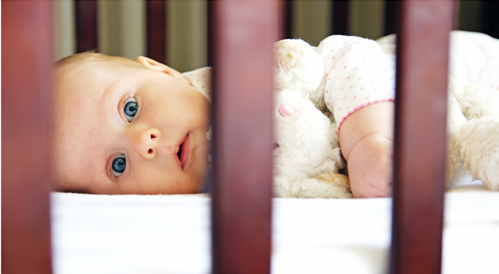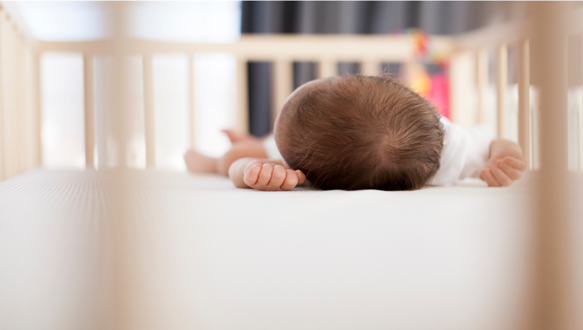.jpg?width=864&height=292&name=daniel-thomas-_tYNzEqehMk-unsplash-scaled-e1666295347863-2048x691%20(1).jpg)
I love losing an hour of sleep, said no parent ever!
We caught up with Georgie from Dreamy Little Sleepers for her top tips on how to copy with the clock change!

Contrary to what we think of the clocks going back an hour, sadly we have to deal with it.
But as parents we have a million and one other things to think about. Before we know it the clock change has happened, and your little one – who was waking at 6.30am – is now waking at 5.30am. As if we weren’t exhausted enough. Cue the caffeine!
So, what do you do if your child is waking too early now the clocks have gone back an hour?
Don’t panic by rushing naps and/or bed time
Stress and anxiety can be sensed by our little ones. If you feel tense and irritable when you put your baby to bed, that’s how they are going to feel, when they need to feel calm and comforted.
Give yourself a minute or two alone to take your mind away from what might be causing you stress (even if that is your little one!). Take some deep breaths before you take them up to get ready for sleep.
If you feel it is chaotic in your household, try to lay things out ahead of time in their room. Nothing feels better than being organised.
Keep to your usual sleep routine as closely as you can too. If your child is getting irritable in the early evening, try cutting bath time, or skipping it for the first night. Or read one book rather than two or three.
Gently, shift your nap time/s and bed time later for a few days
If you follow a timed schedule, or your little one is sensitive to change, then I suggest adjusting your schedules gradually. This will mean your whole schedule will shift too – meal times & bath time etc.
Remember nap time and bed time are out of sink by an hour, but by pushing sleep later by 10-15 minutes every day or so – until you get back to the time they were on – you will help to avoid over-tiredness kicking in while they get back to a comfortable schedule.
For example, if your child was going to bed at 7pm, based on a 10-15 minute sleep shift, your sleep schedule might look like this:
| Saturday 29th | Sunday 30th | Monday 31st | |
| Wake up | 6.30am | 5.30am | 6am |
| Out of bed | 6.30 – 6.45am | 6am | 6 – 6.15am |
| Nap | 12.30pm | 11.40 – 11.45am | 11.50 – 12pm |
| Bedtime | 7pm | 6.10 – 6.15pm | 6.20 – 6.30pm |
And continue in this pattern over a week or so, as you move the time every/every other day until you get back to your 6.30am wake up (or later, fingers crossed!) and 7pm bed time. These times can vary and are a guide only.
You can adjust it by 30 minutes for the older (school aged) children over a couple of days, or if you feel happy to go with the flow, continue with the new time and bear the teenager within them for a few days!
Always aim for a normal wake window range appropriate for their age, typically the last wake window of the day is the longest.
If your little one doesn’t nap well, you will want to offer an earlier bed time than usual
When a baby or child is not getting enough sleep, this can cause night wakings and create early wakings. In order to get them back on track, having an early bed time for a couple of days – or more if necessary – to make up for short or missed naps, can really help to reset their sleep cycles.
When the clocks have gone back, you will naturally be on the earlier schedule, so your 7pm bed time will now look like 6pm. If they missed a nap or had a short nap, consider bringing that bed time even sooner than 6pm until they get back on track.

Check their sleep environment
With darker evenings come cooler temperatures, and temperatures naturally drop in the early hours of the morning too. So checking your thermostats and tweaking timings when the heating comes on overnight, can keep your little one comfortable.
Are they wearing enough layers, or perhaps too many?
Making sure they are dressed appropriately for the room temperature can make a difference. 16 – 20 degrees is considered a safe and comfortable room temperature.
Is the room dark enough?
Checking if the bedroom is dark enough for sleep can help your child to settle and stay settled. There are simple and inexpensive fixes; a travel blackout blind, a bed sheet/blanket, or even household products like foil or cardboard. It might sound like an effort but it can make all the difference.
Is your child afraid of the dark?
Night lights are great, but be mindful not to use white/blue lights, as these tend to disrupt melatonin production in the early evening. This is a natural hormone that we produce for sleeping. Stick to the orange/red tones which are much more gentle and calming, and always keep cables out of reach so it is not a danger to them.
A toddler clock can be useful in this scenario
Young children don’t have any concept of time. This can be great most of the time, but in a sleep scenario it’s more difficult, especially if they wake up in the morning and think it’s breakfast time at 5am!
A toddler clock can help your little one to understand when it is appropriate to get out of bed for the day. They are designed to use light to naturally wake them up, signalling the sun rising as a visual reminder. So if the light isn’t on they know it is still bed time.
Keep these out of reach so they cannot be tampered with; you don’t need to be fooled by a toddler, by making you think the time is later than it is in the morning because they turned it on… talking from experience!
Enjoy the outdoors

Fresh air and natural light help to reset your child’s natural sleep cycle, and doing this ahead of naps or dinner time can have a positive impact. Not only is it great for sleep but it boosts moods for the whole family.
If the weather has turned, get the puddle suits out and wellies at the ready. Kids love splashing around in the wet! If that just isn’t you and your child, or they are too young, a well lit room can help.
Ask for support
If you have a family member or friend who can help for a couple of days, extra support can take the added stress out of bed time! But know it won’t last forever, and you will all get through it.
We have to remember we have ALL lost an hour’s sleep, which will make us more irritable, but they are only little and cannot regulate emotions. We have to cut them some slack and be prepared that the next few days might be hard.
If you still feel completely overwhelmed, exhausted and perhaps something isn’t working for your little one, there could be other factors at play. Why not schedule a call with me for free, and we can get to the bottom of what is going on.
About the author

Georgie – Dreamy Little Sleepers
Certified Sleep Consultant, trained through the world-renowned Family Sleep Institute.
Using scientific, evidence-based coaching methods, and up to date safety guidelines from the NHS, the Lullaby Trust and American Academy of Paediatrics.
